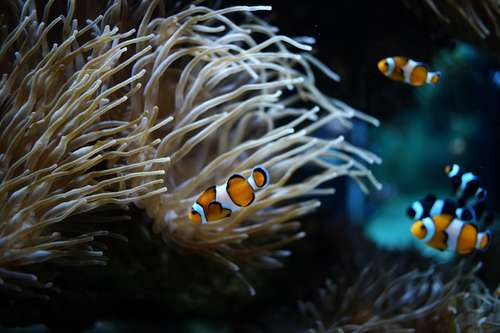This article invites you into the surprisingly delightful world of fish grooming, a fascinating behavior that suggests our aquatic friends might experience pleasure much like mammals do. Recent research on coral reef species offers intriguing insights into fish interactions, hinting that these creatures aren't simply following instinctive cleaning routines—they appear to actively seek out grooming sessions.
If you’ve ever wondered whether there’s more to the underwater world than meets the eye, you’re not alone. Observing fish engage in grooming behaviors can evoke images of a cozy spa day under the sea, where every routine session could promote not only physical cleanliness but also emotional wellbeing. The notion that fish derive happiness from such interactions challenges our conventional understanding of animal care and highlights a deeper social complexity in marine life.
It’s amazing to think that while we often celebrate human self-care regimens, our finned companions might be enjoying similar benefits without our notice. Just imagine, the little nibbles and gentle scrapes could actually be comparable to a massage, invoking feelings of comfort and relaxation that are essential for their overall health.
Understanding Fish Grooming
In this section, we dive into what fish grooming really entails. As we explore, you’ll learn about the different types of interactions that are part of this intriguing behavior. These playful cleaning sessions are not just about removing parasites—they can also be a way for fish to bond and communicate.
Many coral reef species have been observed engaging in mutual cleaning sessions, where one fish takes on the role of a cleaner while another patiently receives the service. This mutualism has a dual benefit: the cleaner fish get a meal while the client fish enjoy the grooming benefits that enhance their wellbeing. When you watch these interactions, it almost feels like witnessing a vibrant community event, where each participant contributes to maintaining a healthy and happy lifestyle.
The behavior is so telling that scientists now believe that these sessions might actually generate pleasure for the fish. Imagine the sensation of being gently cleaned by a friend—it’s a moment of trust and relaxation. Some researchers even mention that the process may be accompanied by the release of endorphins, which are chemicals typically associated with pleasure and reward in mammals!
The Science Behind Aquatic Grooming Behavior
Let’s get into some interesting science behind this phenomenon. Studies on underwater grooming have shown that fish not only clean themselves but also seem to select specific partners for these interactions. It appears that fish grooming is a sophisticated behavior that provides both physical benefits, such as parasite removal, and emotional benefits by reinforcing social bonds.
Observations from coral reefs, which are bustling with species diversity, indicate that fish actively seek out these grooming interactions. It’s not just random behavior—fish appear to know who offers the best service and when they need it most. This selective nature is comparable to how we choose a favorite salon or spa, carefully considering where we feel most comfortable and well-cared-for.
This research is transforming how we view fish care. It’s not simply about survival—it’s about quality of life under the sea. Even though fish are not mammals, they demonstrate a form of aquatic pleasure that blurs the lines between instinct and emotion. And isn’t it fascinating to see how nature finds ways to ensure that every creature, no matter how different, has its own method of self-care?
Implications for Fish Wellbeing and Social Behavior
Before you think that this is merely an adorable anecdote, consider the broader implications. When fish engage in grooming, they’re not just keeping clean; they’re also reinforcing complex social structures that contribute to their overall health. This behavior may be an indicator of communal wellbeing and a sign of a vibrant, interactive underwater society.
There’s an important parallel to be drawn to human interactions. Just as we feel uplifted by a spa day or a massage, fish too might experience an enhanced state of wellbeing after their grooming sessions. Studies suggest that the removal of parasites improves immune function and reduces stress, leading to healthier, more vibrant creatures. It’s like a natural boost without the need for any manufactured intervention!
Many researchers point out that these observations open up a new realm in the study of marine life grooming and fish social behavior. The grooming benefits for fish extend beyond mere cleanliness—they promote a sense of community and are likely linked with emotional satisfaction. This might even explain why some fish seem to return repeatedly to their favorite cleaner stations, much like we relish a visit to a beloved local spa.
In addition, sustainable fish care practices might benefit from these findings. Understanding the nuances of aquatic pleasure could lead to enhanced marine life management, ensuring that our conservation efforts consider not just the survival, but the happiness and social fulfillment of these creatures.
Exploring the Broader Impact of Underwater Grooming
There is no doubt that the concept of fish cleaning stretches far beyond the obvious physical benefits. In this final section, we reflect on how grooming interactions are reshaping our understanding of underwater behavior. It’s an exciting time for marine biologists and animal lovers alike, as we connect with the subtle intricacies of fish health and social dynamics.
Think of it in human terms: when you receive a thoughtful gesture from a friend, you feel better both physically and emotionally. Similarly, the uncomplicated act of being groomed could be a cornerstone in the intricate lives of fish, making their underwater existence richer and more meaningful. This dynamic interplay of care and comfort offers us a window into how even the simplest behaviors can reflect complex emotional landscapes.
Moreover, these findings also encourage us to re-evaluate our pets and even our wild animals, recognizing that care and social bonds are fundamental to well-being across all species. The idea that fish might experience aquatic pleasure invites us to further investigate other unexpected facets of animal grooming, from birds to primates, and even to the insects that often go unnoticed.
In the vast and interconnected world of marine life, every grooming session serves as a reminder that nature is full of surprising behaviors and enchanting rituals. Just as we share moments of intimacy and care with those around us, fish create their own networks of social support and wellbeing, revealing that the essence of pleasure is universal, regardless of the species.
This exploration into fish grooming has not only broadened our scientific horizons but also given us a fresh perspective on empathy and interspecies relationships. It’s a testament to the intricate tapestry of life under the sea and offers a gentle reminder that happiness and care are more common in nature than we ever imagined!




